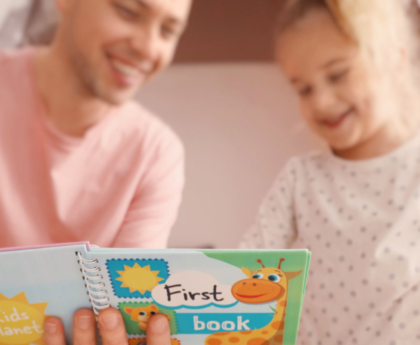Your daughter races through the final chapter of her book, eyes dancing with excitement. She can’t wait to tell you what happened to her favorite character. But before she can share the story, you hand her the reading log. Watch the light dim in her eyes as she sighs and reaches for a pencil: another night, another form to fill out, another parent signature required.
This scene plays out in homes across the country every school night. Reading logs have become standard homework in elementary schools, sold as tools to encourage reading and keep parents informed. But researchers have been quietly sounding an alarm for over a decade: these logs might be doing the opposite of what we hope.
The Numbers Tell a Troubling Story
Children are reading less than ever before. According to a 2025 survey by the National Literacy Trust that gathered responses from 114,970 children aged 5 to 18, only 32.7% of children aged 8 to 18 said they enjoyed reading in their free time. That represents a 36% drop since 2005. Even more concerning, fewer than 1 in 5 children (18.7%) read daily in their free time, a decline of nearly 20 percentage points over two decades.
What Research Shows About Mandatory Logs
In 2012, researcher Sarah S. Pak conducted an experiment with 112 second and third graders that examined mandatory versus voluntary reading logs. One group received mandatory reading logs requiring at least 20 minutes of reading each night with parent signatures. The other group was simply encouraged to read, with logs available but optional.
After two months, students with mandatory logs showed significant declines in both their interest in reading and their attitudes toward recreational reading. The students who were forced to document their reading started viewing books as work rather than pleasure. Meanwhile, students with voluntary logs reported more positive attitudes toward reading.
The study found that mandatory logs undermined children’s sense of autonomy. When reading becomes something you have to do, measured in minutes and verified by adults, it stops being something you want to do.
Why Choice Matters More Than Minutes
Self-Determination Theory explains what children need to stay motivated: autonomy, competence, and relatedness. Reading logs directly attack autonomy by removing choice and imposing external measurement.
Children know the difference between reading because a story captivates them and reading to fill out a form. The National Literacy Trust survey revealed what actually motivates young readers. Two in five children said they were motivated to read when the material related to a favorite film or TV series, or matched their interests. One in four valued having the freedom to choose what they read. Interest and choice drive reading, not requirements and documentation.
The Hidden Costs
Reading logs teach children that reading is primarily about quantity, not quality. When the goal becomes logging 20 minutes, kids learn to watch the clock instead of getting lost in a story. Some develop strategies to game the system: choosing easier books to finish faster or simply lying about time spent.
Parents find themselves transformed from reading cheerleaders into reading enforcers. Bedtime becomes a battle over whether your child has read enough and remembered to fill out the form. Enthusiastic readers don’t want to stop reading to document their time. Struggling readers view the log as more evidence that reading is hard work rather than entertainment.
Better Ways to Support Young Readers
Parents and teachers have several research-backed alternatives. Instead of tracking minutes, have brief conversations with your child about what they’re reading. Ask open-ended questions about characters or plot developments. These authentic conversations build comprehension while showing genuine interest.
Try reader response journals that offer choices in how children respond. Children might draw a favorite scene, write a letter to a character, or make predictions. The key is providing meaningful options that deepen engagement rather than documenting compliance.
Book talks work beautifully for building enthusiasm. Teachers can implement quick check-ins at the start of independent reading time, where students briefly share what they’re reading.
The simplest approach is creating consistent reading time without documentation. Set aside 20-30 minutes daily for family reading where everyone reads their own chosen material. Model reading yourself. Make books accessible and appealing. Trust that the reading itself holds value without needing proof.
What Parents Can Do Right Now
If your child’s school requires reading logs, consider having a conversation with the teacher. Many teachers appreciate hearing parent perspectives and may be open to discussing alternatives that work for everyone.
If logs remain part of your routine, keep them simple and quick. Fill out the form without making it the focus of reading time. Let your child know that what matters most is the stories they’re enjoying and what they’re learning, not the documentation. Some families find it easier to handle the log based on general reading habits rather than making it a nightly task for children.
Pay attention to what motivates your specific child. Some kids love series books. Others want information about topics they’re passionate about. Feed whatever lights up your child’s eyes. Create a reading-rich environment where books are visible and accessible. Visit the library regularly and let your child choose books that interest them.
Children who struggle with reading benefit from systematic, explicit instruction in phonemic awareness, phonics, fluency, vocabulary, and comprehension during designated learning time. This focused instruction works best when kept separate from independent reading for pleasure. Address skill gaps directly with evidence-based approaches while celebrating small victories and building confidence through books your child can read successfully.
Ready to Support Your Reader Without the Logs?
Research shows that when children have autonomy and genuine choice in their reading, they’re more likely to develop into engaged, lifelong readers. Approaches that focus on building positive reading experiences tend to support both skill development and enthusiasm for books.
If you’re looking for an approach that builds essential skills without killing motivation, Reading.com provides systematic, research-based instruction in the five pillars proven to create skilled readers. Unlike reading logs that focus on time served, Reading.com focuses on skills mastered and progress celebrated. Start your 7-day free trial today and experience the difference that science-based, joy-preserving reading instruction can make.





